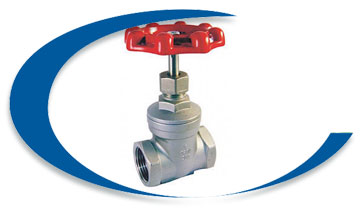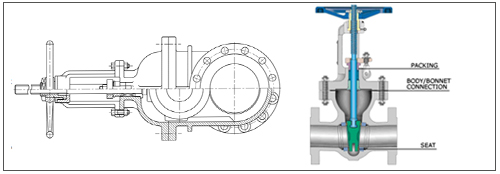Gate Valve

Gate valves are primarily designed to start or stop flow, and when a straight-line flow of fluid and minimum flow restriction are needed. In service, these valves generally are either fully open or fully closed.The disk of a Gate valve is completely removed when the valve is fully open; the disk is fully drawn up into the valve Bonnet. This leaves an opening for flow through the valve at the same inside diameter as the pipe system in which the valve is installed. A Gate valve can be used for a wide range of liquids and provides a tight seal when closed.We are an ISO 9001:2008,ISO 9001-2008, ISO 14001-2004, OHSAS 18001-2007, NSIC-CRISIL, EEPC, and QA-UKAS (ISO 9001-2008), SSI Certified company that follows total Quality Management System. and have been recognized as one of the world’s leading stockists and manufacturer of quality metals for over two decades and are committed to quick responses, unsurpassed quality, competitive pricing, reliable deliveries and an exhaustive inventory.
Gate Valve Specification
| Type | Gate Valve |
| Standred | DIN 3352 F5 |
| Material | Industrial-grade steel, carbon steel, stainless steel, alloy steel and special steel |
| Size | DN40-DN400 |
| Diameter | 1”to13” |
| Order | Accept custom order |
Construction of a Gate valve
Gate valves consists of three main parts: body, bonnet, and trim. The body is generally connected to other equipment by means of flanged, screwed or welded connections. The bonnet, which containing the moving parts, is attached to the body, usually with bolts, to permit maintenance. The valve trim consists of the stem, the gate, the disc or wedge and the seat rings.
Advantages and disadvantages of Gate valves
Advantages:
• Good shutoff features• Gate valves are bidirectional and therefore they can be used in two directions
• Pressure loss through the valve is minimal
Disadvantages:
• They can not be quickly opened or closed• Gate valves are not suitable for regulate or throttle flow
• They are sensitive to vibration in the open state
Gate Valve Components
There are three main parts of a gate valve: body, bonnet, and trim.
Body
The body of a gate valve holds all of the operational parts of the valve. It is connected to the system with one of the mounting options below. The mounting option should be selected based on the current system mounting features and the type and size of the media.
| Threaded | The valve has internal or external threads for inlet or outlet connection(s). |
| Compression fitting | A sealed pipe connection without soldering or threading. As the nut on one fitting is tightened, it compresses a washer around the second pipe, forming a watertight closure. |
| Bolt Flange | The valve has a bolt flange(s) for inlet or outlet connection. |
| Clamp Flange | The valve has a clamp flange(s) for inlet or outlet connection. |
| Union | The valve has a union connection for inlet or outlet connection(s). |
| Tube fitting | The valve has a connection for directly joining tubing at the inlet and/or outlet connections. |
| Butt weld | The valve has a butt weld sized connection for inlet or outlet connection. |
| Socket weld/solder | The valve has a socket weld connection for inlet or outlet connection. |
| Metal face seal | The valve has a metal gasket sandwiched between two fitting parts. The gasket forms a face seal on each side of the fitting. |
The valve has a metal gasket sandwiched between two fitting parts. The gasket forms a face seal on each side of the fitting.
Bonnet
The bonnet of a gate valve contains the moving parts and is attached to the valve body. The bonnet can be removed from the body in order to allow for maintenance and replacing parts.
Trim
The trim of a gate valve contains the functioning pieces of the valve: the stem, the gate, the disc or wedge, and the seat rings. Stem- The stem of a gate valve is either a rising stem or a non rising stem. The stem is responsible for the proper positioning of the disk. Non rising stems will almost always have a pointer-type indicator mounted onto the upper end of the stem to indicate valve position. This configuration protects the threads from carrying dirt into the packing because the stem threads are held within the boundary of the valve packing. Rising stems rise out of the flow path when the valve is opened. They can either have a stem that rises through the hand wheel or have a stem that is threaded to the bonnet.
Seat- The seat of a gate valve is either integral with the valve body or in a seat ring type of configuration. The seat ring construction is either threaded on to the body or pressed into position and the seal welded to the valve body. Pressed and welded is recommended for higher temperature applications. Press-in or threaded-in seats permit variation in the seat material verses the material of the body of the valve.
It is important to consider the size of the valve and system when selecting a gate valve. Gate valves are linear motion valves and therefore are taller than other manual valves. This is especially true if the valve uses a rising stem. Most of the time gate valves should be installed horizontally (perpendicular to the ground) with the manual actuator in the top position. This allows for easy access for maintenance and replacing parts. Smaller gate valves can be installed in vertical lines, but gravity tends to pull the valve out of alignment.
Packaging Of Gate Valve
1.Hessian / PVC Cloth Bundles with PVC Box Strap or Hexagonal Bundles2.Wooden Crate
3.Wooden Box made of treated wood or Plywood sheet
4.Bundles (hexagonal)
5.Crates (steel/wooden)
6.Special Crates
Application Of Gate Valve
1.Food Industries2.Water Industries
3.Oil & Gas Industries
4.Automotive Industries
5.Ship Building Industries
6.Petro-Chemical Industries
7.Engineering Cement Industries
8.Transport Industries-Rail and Road
9.Chemical & Pharmaceutical Industries
10.Construction Industries / Building Systems
